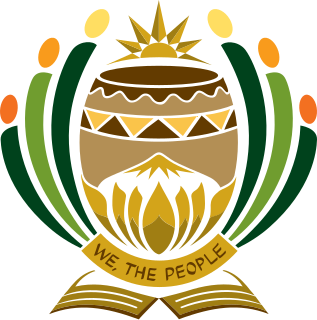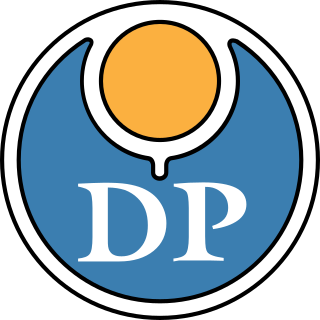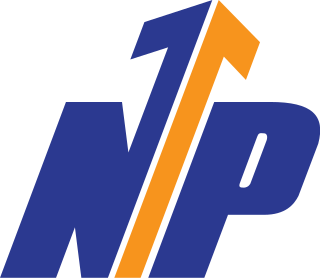Related Research Articles
The Republic of South Africa is a parliamentary representative democratic republic. The President of South Africa serves both as head of state and as head of government. The President is elected by the National Assembly and must retain the confidence of the Assembly in order to remain in office. South Africans also elect provincial legislatures which govern each of the country's nine provinces.

The Parliament of the Republic of South Africa is South Africa's legislature; under the present Constitution of South Africa, the bicameral Parliament comprises a National Assembly and a National Council of Provinces. The current twenty-seventh Parliament was first convened on 22 May 2019.

The Democratic Party (DP) was the name of the South African political party now called the Democratic Alliance. Although the Democratic Party name dates from 1989, the party existed under other labels throughout the apartheid years, when it was the Parliamentary opposition to the ruling National Party's policies.

The National Party, also known as the Nationalist Party, was a political party in South Africa founded in 1914 and disbanded in 1997. The party was an Afrikaner ethnic nationalist party that promoted Afrikaner interests in South Africa. However, in 1990 it became a South African civic nationalist party seeking to represent all South Africans. It first became the governing party of the country in 1924. It was an opposition party during World War II but it returned to power and was again in the government from 4 June 1948 until 9 May 1994.

The United Party was a political party in South Africa. It was the country's ruling political party between 1934 and 1948.
The Progressive Party was a liberal party in South Africa which, during apartheid, was considered the left wing of the all-white parliament. The party represented the legal opposition to apartheid within South Africa's white minority. It opposed the ruling National Party's policies of apartheid, and championed the Rule of Law. For 13 years its only member of parliament was Helen Suzman. It was later renamed the Progressive Reform Party in 1975, and then Progressive Federal Party in 1977. The modern Democratic Alliance considers the party to be its earliest predecessor.

The Herstigte Nasionale Party is a South African political party which was formed as a far-right splinter group of the now defunct National Party in 1969. The party name was commonly abbreviated as HNP, although colloquially they were also known as the Herstigtes.
General elections were held in South Africa on 24 April 1974. They were called one year earlier than scheduled by Prime Minister John Vorster on 4 February. The House of Assembly was increased from 166 to 171 members. The election was once again won by the National Party, with a slightly increased parliamentary majority.

General elections were held in South Africa on 6 September 1989, the last under apartheid. Snap elections had been called early by the recently elected head of the National Party (NP), F. W. de Klerk, who was in the process of replacing P. W. Botha as the country's president, and his expected program of reform to include further retreat from the policy of apartheid. The creation of the Conservative Party had realigned the NP as a moderate party, now almost certain to initiate negotiations with the black opposition, with liberal opposition openly seeking a new constitutional settlement on liberal democratic and federalist principles.

The New Republic Party (NRP) was a South African political party. It was formed as the successor to the disbanded United Party (UP) in 1977 and as a merger with the smaller Democratic Party. It drew its support mainly from the then Province of Natal, and tried to strike a moderate course between the apartheid policy of the ruling National Party (NP) and the liberal policies of the Progressive Federal Party (PFP).

General elections were held in the Gold Coast on 8 February 1951. Although elections had been held for the Legislative Council since 1925, the Council did not have complete control over the legislation, and the voting franchise was limited to residents of urban areas meeting property requirements and the councils of chiefs. The 1951 elections were the first in Africa to be held under universal suffrage.
Although the Democratic Alliance of South Africa in its present form is fairly new, its roots can be traced far back in South African political history, through a complex sequence of splits and mergers.

General elections were held in Botswana on 20 October 1979. The result was a fourth successive landslide victory for the Botswana Democratic Party (BDP), which won 29 of the 32 elected seats, including two in which they were unopposed.
The National People's Party was a political party registered on a national level with the Independent Electoral Commission (IEC) of South Africa. It came into existence when Badih Chaaban, a member of the Cape Town City Council crossed the floor from the Africa Muslim Party (AMP) in an attempt to wrest control of the city council from the Democratic Alliance-led multi-party coalition. The party was set up by Chaaban shortly before the floor crossing period in 2007 with the help of David Sasman, its interim leader. It should not be confused with the National People's Party, renamed the Minority Front, led by Amichand Rajbansi during the apartheid era.
The South African Party was a small political party in South Africa from 1977 to 1980.

Good is a South African political party that was formed in December 2018. It is led by its founder Patricia de Lille, current Minister of Public Works and Infrastructure and former Mayor of Cape Town. The party's policies are predominantly left-wing and its platform is premised on social democracy, environmentalism, anti-racism and Broad-Based Black Economic Empowerment. The party's stronghold is the Western Cape and mainly draws support from the Coloured community.

The February 1974 United Kingdom general election in Northern Ireland was held on 28 February with 12 MPs elected in single-seat constituencies using first-past-the-post as part of the wider general election in the United Kingdom.

The 2024 South African general election will be held in 2024 to elect a new National Assembly as well as the provincial legislature in each province. These will be the seventh elections held under the conditions of universal adult suffrage since the end of the apartheid era in 1994. The new National Council of Provinces will be elected at the first sitting of each provincial legislature. Ever since the first post-apartheid election in 1994, the African National Congress has held a majority of seats in the National Assembly and thus governed alone, with the exceptions of the Government of National Unity from 1994 to 1999 and from 1999 through to 2004 with the Inkatha Freedom Party.
Solidarity was a political party created in the lead-up to the 1984 South African general election, which determined the makeup of the first House of Delegates, the body within the Apartheid Tricameral Parliament reserved for Indian South Africans. It took its name from the Polish trade union.p. 40 Its first leader was JN Reddy, an influential banker and businessman with a number of company directorships. To be able to lead the party, Reddy relinquished some of his business interests. Another important party member was Pat Poovalingam, the chairman of weekly newspaper "The Graphic". Solidarity appealed more to South Africans with Southern Indian roots, while Amichand Rajbansi's National People's Party appealed more to those with a North Indian heritage.

The 2009 Western Cape provincial election was held on 22 April 2009 alongside the 2009 general elections to elect the 42 members of the 4th Western Cape Provincial Parliament. It was the third time in provincial history that saw a change of government.
References
- ↑ "South Africans to elect new government today". The St. Petersburg Times. 24 April 1974. Retrieved 8 January 2012.
